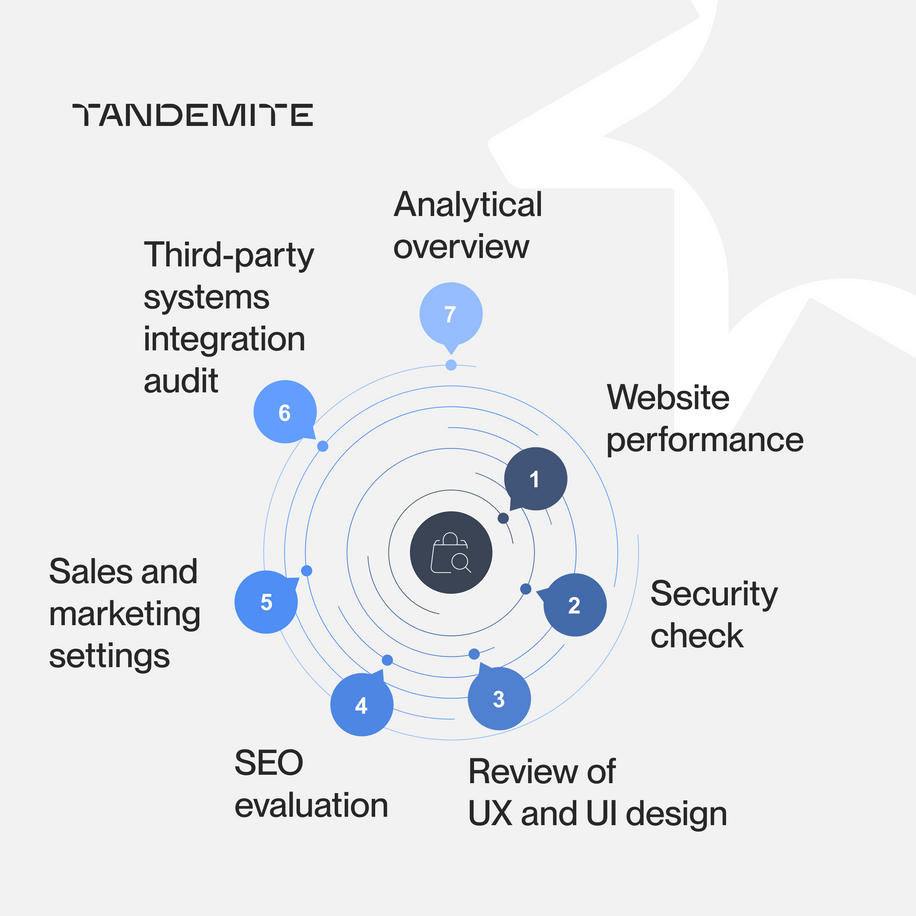Not sure if your Shopware store is optimized? Here’s why you need an audit

You’ve built your online store with care, relying on Shopware to support your sales and connect with customers. But even the best systems need regular checks.
Is your store secure, fast, and using its full range of features? Technical glitches or performance issues might be holding you back without your knowledge.
A professional audit identifies these areas. As customer demands increase in the e-commerce sector, consistent auditing and fine-tuning of your Shopware store becomes a strategic necessity. These actions help maintain your edge in a competitive digital market.
In this article:
- we break down the main focus areas of an e-commerce audit, such as loading speed, user experience, security, and code compliance;
- we explain the measurable advantages this process can bring to your company, whether you operate in wholesale, industrial supply, or manage a complex B2B e-commerce platform.
Why a Shopware audit matters for your online store
If your business involves producing food or consumer goods, you’re likely familiar with the challenges of managing expiration dates and a broad selection of product versions, such as packaging formats, sizes, and flavors. This complexity can create operational challenges. A data and system audit helps you evaluate whether product information is organized correctly, confirms your customers can shop without confusion, and ensures your store is reliably synced with inventory systems to reduce the risk of overselling.
In fashion retail, new collections and frequent product updates are part of the business. A website audit will assess whether your store delivers high-quality visuals, accurate and helpful descriptions, intuitive filtering and sorting options, and a customer-friendly order process.
If you serve B2B clients or operate in manufacturing, you know their buying process involves more than just clicking “add to cart.” Your customers rely on detailed product information, flexible configurators, personalized pricing structures, and integration with internal purchasing systems. An expert audit of your Shopware store can confirm whether these expectations are being met and whether your platform supports a smooth wholesale purchasing experience.
As your business grows, so do the demands on your IT infrastructure. Medium and large companies often need their Shopware stores to interface with PIM, CRM, ERP, and other systems. A Shopware audit is essential for identifying weak points and finding ways to improve. It helps you understand whether your current setup can support increased website traffic, product diversity, and operational complexity, while keeping your system integrations running smoothly.

What is covered in a Shopware store audit?
Conducting a Shopware audit is an important step in improving your e-commerce store. This detailed analysis covers many different areas to help you understand how your eCommerce business is performing and what improvements can make it even better (like optimizing mobile display and admin navigation).
We approach your platform with a full 360-degree review, leaving no area overlooked. Learn about the 7 fundamental areas we assess in every audit.
1. Analysis of critical website performance elements
(Online success starts with speed and reliability – we help you deliver both)
- Page speed diagnostics: We find out what’s causing slow loading times and fix it.
- Database review: Our team examines the database to make sure it's optimized for quick and reliable access to data.
- Server and hosting analysis: We analyze if your hosting plan is sufficient and if your server configuration supports your store’s needs.
- Plugin and integration performance: We check the impact of plugins and system integrations on speed and stability.
- Traffic load testing: We assess how your store performs under peak demand to help you prepare for busy shopping periods.
2. Security check
(Safeguarding your store and customers from digital threats)
- Vulnerability scanning: We search for areas where your store’s defenses may be insufficient or exposed to cyber threats.
- Verification of security compliance: We check that your store complies with current data security standards and legal requirements.
- Audit of access control structures: We examine how access permissions are configured to ensure they do not allow unauthorized use.
- Password policy and security controls: We analyze your password strategy and additional security measures, including encryption, to safeguard both customer data and transactions.
3. Review of UX and UI design
(Ensuring your store feels natural to use and supports seamless interaction)
- User-friendly navigation and search: We assess how intuitive the layout is for users. Can they find products easily? Is the site structure logical?
- Responsive performance: Your online store should adapt smoothly to any screen size. We ensure it performs just as well on phone and tablet as it does on desktop.
- Purchase experience: We check for a straightforward and fast ordering process with no extra steps that might create drop-offs.
- Interface design and brand alignment: The design should support trust and usability. We review your layout for clarity and visual appeal.
- Real-user usability testing: We run sessions with everyday users to uncover real pain points and improve the customer journey.
4. SEO evaluation
(So your online store appears prominently in Google searches)
- Page speed diagnostics (analyzed through the lens of SEO): Google promotes websites that load efficiently. Therefore, optimizing load speed is important not only for maintaining strong technical performance across your platform but also for SEO purposes.
- Adherence to Google’s Core Web Vitals: These are the benchmarks set by Google to ensure websites are user-friendly. Meeting these metrics is essential for improving usability and search engine position.
5. Review of sales and marketing settings
(Making sure your advertising efforts are targeted and effective)
- Promotion and discount functionality: Do your special offers, discounts, and coupons operate as expected? Are they easy for shoppers to use at checkout?
- Product recommendation engine: Does your site provide suggestions that reflect customer preferences and browsing history?
- Integration with marketing tools: Is your online store seamlessly linked with your email marketing service and social media platforms?
- Remarketing effectiveness: Are your remarketing efforts helping to bring back potential buyers who didn’t convert?
- Customer path analysis: Do you have visibility into where your traffic is coming from and how purchases are made?
6. Third-party systems integration audit
(Connecting all systems into one cohesive ecosystem)
- Review of integration stability and accuracy: We assess how effectively your systems communicate – whether it's product information management (PIM), enterprise resource planning (ERP), customer data (CRM), or logistics and payments. Are there any delays or errors in how data flows?
- Monitoring data transfer efficiency: We check for real-time, error-free synchronization of vital information such as product details, customer records, and orders.
- Detection of synchronization issues: We help uncover potential points where information may be delayed, lost, or inaccurately shared between systems.
7. Analytical overview
(To equip you with data-backed insights for smart business moves)
- Accuracy of analytics tool setup (e.g., Google Analytics): Are your tracking tools providing the precise data you need for meaningful analysis?
- Data-driven decision-making: Do you use your analytics results to judge past performance and plan ahead?
- Recognizing the most valuable KPIs: What indicators give you the clearest view of your progress toward business objectives?
Why should you audit your Shopware store?
Think of a Shopware audit as a health check for your online store. It reveals strengths, uncovers weaknesses, and offers guidance on how to improve.
More than a technical task, it's a business-enhancing process designed to bring you measurable and lasting value. Let’s break down the benefits.
✅ Achieve higher sales and stronger conversion rates
Strategic improvements to UX and UI for higher conversion: A well-structured, user-friendly interface increases customer engagement and boosts completed sales.
Increased order completion by optimizing the checkout process: Audits highlight problem areas that may be causing customers to exit before purchasing.
Search engine optimization increases discoverability and traffic: A fast, well-optimized site with useful content ranks higher in search engines, helping bring more visitors to your store.
✅ Make operations smoother and more effective
Removing friction points in your processes: Audits reveal where your processes are inefficient. Once these points are improved, your operations become smoother, and your team will feel more in control of their tasks.
Improved operational efficiency by connecting key systems: Shopware integration with PIM, ERP, and CRM systems enables automatic data transfer. This leads to fewer errors and saves time compared to manual processes.
✅ Lower your operational costs
Minimized operational risks through proactive monitoring: Detecting potential technical faults in advance allows timely intervention, preventing service interruptions and protecting revenue.
Marketing backed by real data: A comprehensive audit shows you which marketing actions deliver value. With better integration with tools and clear data analysis, your decisions will be grounded in reality, supporting more strategic and cost-effective actions.
Better long-term value from optimized operations: Investing in performance and scalability upfront helps ensure your store runs efficiently as it grows. This leads to long-term cost reductions.
Reducing hosting costs with smarter resource usage: Optimizing your system allows your store to function effectively even with limited resources. This means you can cut down on hosting expenses while maintaining performance.
✅ Deliver a more satisfying customer experience
Speed and usability across devices: Modern shoppers want instant access and smooth browsing, no matter what device they’re using. Fast, mobile-friendly websites meet these expectations and boost satisfaction.
User-friendly navigation structure: Helping users find products easily builds trust and improves the chances of completing a sale.
Seamless order and payment flow: The fewer obstacles during checkout, the more customers are likely to buy and return.
Strategic customer personalization: An audit helps you learn more about your audience, so you can offer more relevant products and personalized communication.
✅ Improve the safety of your digital data
Compliance and data security: Ensuring customer data is safe minimizes legal risks and protects your brand image.
Establishing trust through online security: Trust begins with safety. Your customers should feel confident in every transaction they make on your platform.
✅ Fully utilize Shopware’s potential for growth
Making the most of Shopware’s features: Your current setup might not reflect everything Shopware can do. An audit can reveal hidden tools and features that can boost your business operations.
Future-proofing your online store: A scalable and optimized platform ensures your store can adapt to future trends and growing customer demands.
Summary
Treat your Shopware store as a strategic asset, not just a website. Regular optimization and expert evaluation are essential to keeping it competitive.
Why invest in a Shopware audit? To make your store work better in every way – faster, safer, and more efficiently. From enhancing performance to tightening security, an audit helps e-commerce businesses of all sizes improve their digital infrastructure and customer service.
You can expect:
- Higher sales and better conversion rates,
- More efficient business operations,
- Lower costs due to smarter resource use,
- Enhanced user experience for shoppers,
- Improved data safety and compliance,
- Full advantage of Shopware’s most powerful functions.
Benefit from an expert-led tech audit. Our team will conduct an in-depth review of your e-commerce system, uncover any weaknesses, and offer actionable advice designed to drive your business forward.





